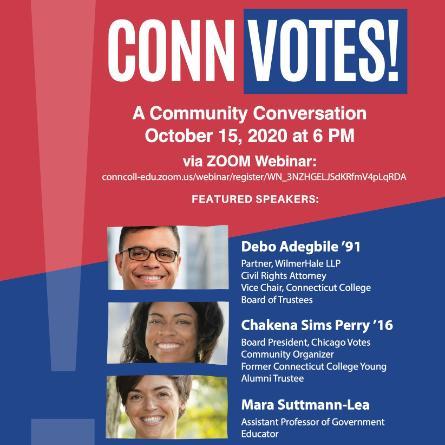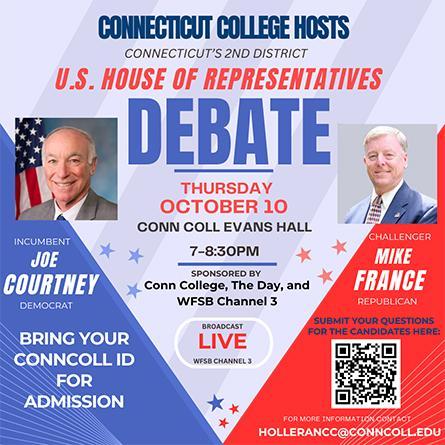
The College community participates in a discussion about the 2020 election
Democracy itself is on the ballot.
That sentiment, expressed by Mara Suttmann-Lea, assistant professor of government, reflected a broad consensus among the panel of Conn faculty, staff, alumni and students who contributed their expertise and experience relating to voting rights and the electoral process in a series of discussions less than three weeks before Election Day.
The event, organized as part of the Agnes Gund ’60 Dialogue Project, was presented via Zoom, and touched on a wide range of issues surrounding voter suppression, strategies for encouraging civic engagement and how the College is doing its part to make the political process more inclusive for voters.
“The struggle does continue,” said Connecticut College President Katherine Bergeron. “As we witness unconscionably long lines at polls in Georgia, or listen to conspiracy theories about mass voter fraud, many of us are wondering what we should do to be sure all voices are heard. It is my hope that through tonight’s dialogue with student, staff, faculty, alumni and trustee leaders we will become not only more deeply engaged in the challenges of this election season, but also more inspired than ever to make our voices heard by exercising this right.”
Debo Adegbile ’91, an attorney who argued to defend the Voting Rights Act of 1965 before the U.S. Supreme Court in the landmark 2013 case Shelby County V. Holder, spoke passionately about the often frustrating ebb and flow of voting rights in America throughout its history and the consistent efforts to constrain and suppress that fundamental right to maintain a status quo that consolidates power in the hands of too few. But he urged students not to be discouraged or to surrender to cynicism in the face of those efforts to exclude and subtract instead of expand voter participation.
“My first vote in a presidential election was in New London, Connecticut in 1988 when I was a student at Conn,” Adegbile recalled. “And I hope that all the students in New London today are registered and are going to exercise their franchise and choose the path of winning through addition and not through subtraction,” he added.
Chakena Perry ’16 echoed Adegbile’s comments on the importance of understanding the historical context of voting rights and suppression tactics, and discussed her work educating and mobilizing younger voters. Perry serves as Board President for Chicago Votes Action Fund, a nonpartisan organization in her home city of Chicago, Illinois, and as Chairwoman of the Cook County Illinois Young Democrats. She acknowledged the difficulties income inequality and other socioeconomic barriers pose for many voters to participate in the electoral process. But she argued that in addition to providing younger voters with the “hows” surrounding voting, it’s also essential to communicate the “why” in voting.
“When I talk about people finding the ‘why’ in their votes, it means that to normalize the voting process and keep the electorate engaged, people need to get to the root of their lived experience and the things they care about so they can really connect the dots between voting and community issues,” Perry said, adding that down-ballot races such as electing judges and school board members are often ignored by young people, but have a very tangible impact on issues they care about like criminal justice reform.
This past summer, Bergeron joined more than 160 college and university leaders across the country by signing the All In Campus Democracy Challenge, a nonpartisan initiative, sponsored by Civic Nation, a nonprofit that works to increase civic engagement and political participation among college students in federal, state and local elections. The challenge calls for 100% campus voter turnout for eligible voters.
The initiative, spearheaded by Conn’s Holleran Center for Community Action, continues to build on the College’s tradition of political participation and is being led by Angela Barney, assistant director of the Program in Community Action at the Holleran Center. Barney also participated in the Conn Votes event.
“I think now more than ever it is important to encourage young people to be engaged in our political system because they have the ability to shake up politics, whether that be through voting or other civic and political engagement initiatives,” Barney said.
Two senior student leaders who have been instrumental in helping Barney oversee the All In Challenge and promote voter engagement on campus, Jozette Moses ’21 and Julia O’Connell ’21, also joined the Zoom event to discuss the Camels Vote website they created, that offers registration and voting information and provides opportunities for students to sign up for transportation to the polls through the Holleran Center on Election Day.
“A large part of what Julia and I have done with Camels Vote has been social media based, because we think that’s a great platform for students who are voting for the first time,” Moses said.
O’Connell highlighted the success of the Camels Vote Instagram account they created, which went viral over the summer when one of their posts about the importance of the youth vote received more than 72,000 likes.
After presentations from Suttmann-Lea, who specializes in voting processes, and Cherise Harris, associate professor of sociology, the discussion opened up for a Q&A with students and alumni joining the event remotely.
In response to one question about communicating the importance of young people voting, Adegbile spoke of the 2000 election, in which the course of history was changed by fewer than 600 votes in Florida, and then reminded listeners of the courage and peaceful determination civil rights leaders displayed during the events in Selma Alabama in 1965 when they endured vicious police brutality as they marched for the right to vote.
“Now the baton has been passed because democracy requires that the next generation of students take up that baton and run their lap for American democracy and for the rest of the world,” Adegbile said.

